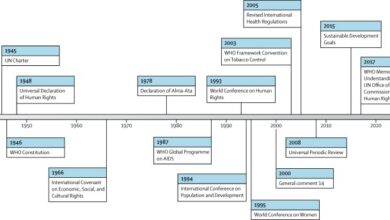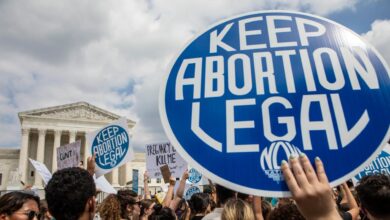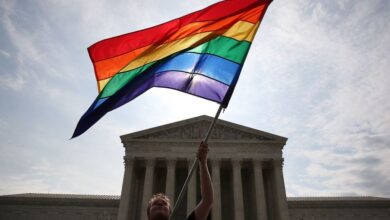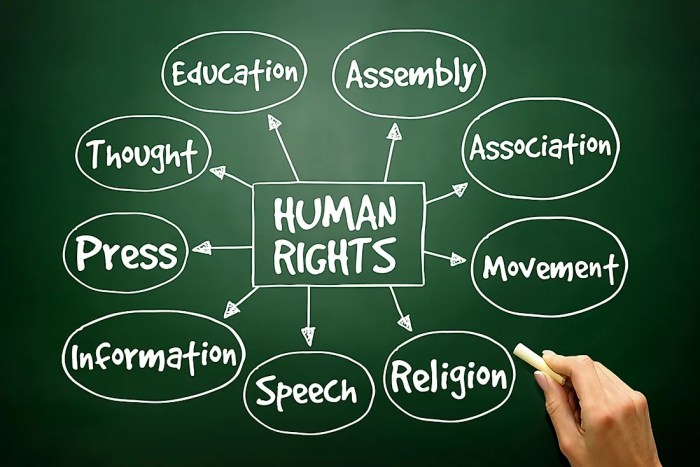
Human Rights for All: A Global Imperative
Human Rights for All, a concept enshrined in the Universal Declaration of Human Rights, is a fundamental principle that underscores the inherent dignity and worth of every individual. This declaration, adopted in 1948, stands as a beacon of hope, outlining essential rights that every human being is entitled to, regardless of race, gender, religion, or any other status.
From the right to life, liberty, and security of person to the right to education, healthcare, and work, the Universal Declaration serves as a blueprint for a just and equitable world.
The pursuit of human rights is a continuous journey, fraught with challenges and complexities. While progress has been made in promoting and protecting these rights, violations continue to occur in various forms, from discrimination and torture to violence and exploitation.
This underscores the need for ongoing advocacy, education, and action to ensure that human rights are not merely aspirational ideals but tangible realities for all.
The Universal Declaration of Human Rights
The Universal Declaration of Human Rights (UDHR) is a landmark document that Artikels the fundamental rights and freedoms to which all human beings are entitled. It was adopted by the United Nations General Assembly on December 10, 1948, following the horrors of World War II.
Historical Context
The UDHR was born out of the desire to prevent future atrocities and establish a common standard of human rights for all. The aftermath of World War II, marked by the systematic violation of human rights, underscored the urgent need for a universal framework to protect human dignity.
The United Nations, established in 1945, recognized the importance of promoting and protecting human rights as a fundamental principle.
Key Articles of the Universal Declaration of Human Rights
The UDHR comprises 30 articles that encompass a wide range of human rights, including:
- Article 1:All human beings are born free and equal in dignity and rights.
- Article 2:Everyone is entitled to all the rights and freedoms set forth in this Declaration, without distinction of any kind, such as race, colour, sex, language, religion, political or other opinion, national or social origin, property, birth or other status.
- Article 3:Everyone has the right to life, liberty and security of person.
- Article 4:No one shall be held in slavery or servitude; slavery and the slave trade shall be prohibited in all their forms.
- Article 5:No one shall be subjected to torture or to cruel, inhuman or degrading treatment or punishment.
- Article 6:Everyone has the right to recognition everywhere as a person before the law.
- Article 7:All are equal before the law and are entitled without any discrimination to equal protection of the law.
- Article 8:Everyone has the right to an effective remedy by the competent national tribunals for acts violating the fundamental rights granted him by the constitution or by law.
- Article 9:No one shall be subjected to arbitrary arrest, detention or exile.
- Article 10:Everyone is entitled in full equality to a fair and public hearing by an independent and impartial tribunal, in the determination of his rights and obligations and of any criminal charge against him.
- Article 11:(1) Everyone charged with a penal offence has the right to be presumed innocent until proved guilty according to law in a public trial at which he has had all the guarantees necessary for his defence. (2) No one shall be held guilty of any penal offence on account of any act or omission which did not constitute a penal offence under national or international law at the time when it was committed.
Human rights are a fundamental principle, a cornerstone of a just and equitable society. It’s about recognizing the inherent worth and dignity of every individual, regardless of their background or circumstance. This pursuit of equality necessitates reaching beyond traditional boundaries, reaching the parts other empires could not reach , to ensure that the promise of human rights truly extends to everyone, everywhere.
Only then can we build a world where all voices are heard, and all individuals are empowered to live with dignity and freedom.
Nor shall a heavier penalty be imposed than the one that was applicable at the time when the penal offence was committed.
- Article 12:No one shall be subjected to arbitrary interference with his privacy, family, home or correspondence, nor to attacks upon his honour and reputation. Everyone has the right to the protection of the law against such interference or attacks.
- Article 13:(1) Everyone has the right to freedom of movement and residence within the borders of each State. (2) Everyone has the right to leave any country, including his own, and to return to his country.
- Article 14:(1) Everyone has the right to seek and to enjoy in other countries asylum from persecution. (2) This right may not be invoked in the case of prosecutions genuinely arising from non-political crimes or from acts contrary to the purposes and principles of the United Nations.
- Article 15:(1) Everyone has the right to a nationality. (2) No one shall be arbitrarily deprived of his nationality nor denied the right to change his nationality.
- Article 16:(1) Men and women of full age, without any limitation due to race, nationality or religion, have the right to marry and to found a family. They are entitled to equal rights as to marriage, during marriage and at its dissolution.
(2) Marriage shall be entered into only with the free and full consent of the intending spouses. (3) The family is the natural and fundamental group unit of society and is entitled to protection by society and the State.
- Article 17:(1) Everyone has the right to own property alone as well as in association with others. (2) No one shall be arbitrarily deprived of his property.
- Article 18:Everyone has the right to freedom of thought, conscience and religion; this right includes freedom to change his religion or belief, and freedom, either alone or in community with others and in public or private, to manifest his religion or belief in teaching, practice, worship and observance.
- Article 19:Everyone has the right to freedom of opinion and expression; this right includes freedom to hold opinions without interference and to seek, receive and impart information and ideas through any media and regardless of frontiers.
- Article 20:(1) Everyone has the right to freedom of peaceful assembly and association. (2) No one may be compelled to belong to an association.
- Article 21:(1) Everyone has the right to take part in the government of his country, directly or through freely chosen representatives. (2) Everyone has the right of equal access to public service in his country.
- Article 22:Everyone, as a member of society, has the right to social security and is entitled to realization, through national effort and international co-operation and in accordance with the organization and resources of each State, of the economic, social and cultural rights indispensable for his dignity and the free development of his personality.
- Article 23:(1) Everyone has the right to work, to free choice of employment, to just and favourable conditions of work and to protection against unemployment. (2) Everyone, without any discrimination, has the right to equal pay for equal work. (3) Everyone who works has the right to just and favourable remuneration ensuring for himself and his family an existence worthy of human dignity, and supplemented if necessary by other means of social protection.
Human rights for all is a fundamental principle, a cornerstone of a just and equitable society. However, the erosion of freedom of speech, often framed as “shredding the first amendment,” shredding the first amendment directly undermines this ideal. When individuals are afraid to speak their minds, or are silenced for expressing dissenting views, the foundation of human rights for all begins to crumble.
(4) Everyone has the right to form and to join trade unions for the protection of his interests.
- Article 24:Everyone has the right to rest and leisure, including reasonable limitation of working hours and periodic holidays with pay.
- Article 25:(1) Everyone has the right to a standard of living adequate for the health and well-being of himself and of his family, including food, clothing, housing and medical care and necessary social services, and the right to security in case of unemployment, sickness, disability, widowhood, old age or other lack of livelihood in circumstances beyond his control.
(2) Motherhood and childhood are entitled to special care and assistance. All children, whether born in or out of wedlock, shall enjoy the same social protection.
- Article 26:(1) Everyone has the right to education. Education shall be free, at least in the elementary and fundamental stages. Elementary education shall be compulsory. Technical and professional education shall be made generally available and higher education shall be equally accessible to all on the basis of merit.
Human rights are fundamental, applying to everyone regardless of their background or beliefs. Yet, the concept of inclusivity is often challenged, as seen in the reaction to “Muslim as apple pie” videos which are met with skepticism. This highlights the need for open dialogue and understanding to truly embrace human rights for all.
(2) Education shall be directed to the full development of the human personality and to the strengthening of respect for human rights and fundamental freedoms. It shall promote understanding, tolerance and friendship among all nations, racial or religious groups, and shall further the activities of the United Nations for the maintenance of peace.
(3) Parents have a prior right to choose the kind of education that shall be given to their children.
- Article 27:(1) Everyone has the right freely to participate in the cultural life of the community, to enjoy the arts and to share in scientific advancement and its benefits. (2) Everyone has the right to the protection of the moral and material interests resulting from any scientific, literary or artistic production of which he is the author.
- Article 28:Everyone is entitled to a social and international order in which the rights and freedoms set forth in this Declaration can be fully realized.
- Article 29:(1) Everyone has duties to the community in which alone the free and full development of his personality is possible. (2) In the exercise of his rights and freedoms, everyone shall be subject only to such limitations as are determined by law solely for the purpose of securing due recognition and respect for the rights and freedoms of others and of meeting the just requirements of morality, public order and the general welfare in a democratic society.
- Article 30:Nothing in this Declaration may be interpreted as implying for any State, group or person any right to engage in any activity or to perform any act aimed at the destruction of any of the rights and freedoms set forth herein.
Significance of the Universal Declaration of Human Rights
The UDHR has played a pivotal role in promoting human rights globally. It has served as a:
- Foundation for International Human Rights Law:The UDHR has inspired the development of numerous international human rights treaties and conventions, such as the International Covenant on Civil and Political Rights (ICCPR) and the International Covenant on Economic, Social and Cultural Rights (ICESCR).
- Universal Standard:The UDHR has established a common standard of human rights that applies to all individuals, regardless of their nationality, ethnicity, gender, religion, or any other status. It has served as a powerful tool for advocating for human rights and challenging human rights abuses.
- Moral Compass:The UDHR provides a moral compass for governments, organizations, and individuals, reminding them of the fundamental values that should guide their actions and decisions.
- Catalyst for Change:The UDHR has inspired countless individuals and organizations to work for the advancement of human rights. It has been used to challenge discriminatory laws and policies, promote equality and justice, and hold governments accountable for their human rights obligations.
Fundamental Human Rights
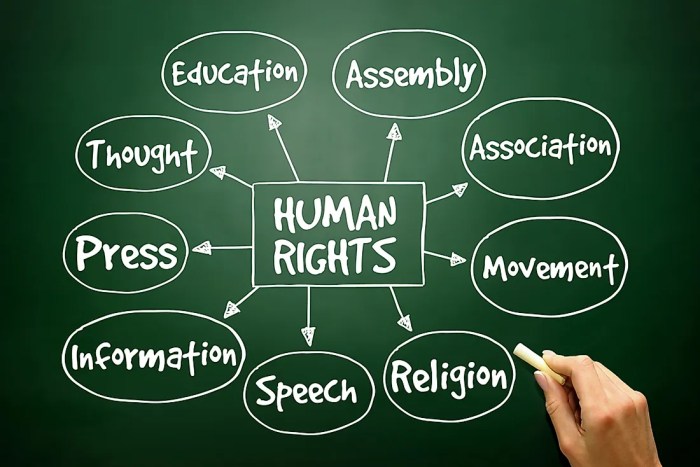
The Universal Declaration of Human Rights (UDHR) serves as a foundational document outlining fundamental human rights, universally applicable to all individuals. These rights are inherent, inalienable, and indispensable for a life of dignity and freedom. This section will delve into the significance of fundamental human rights, focusing on the right to life, liberty, and security of person.
Right to Life
The right to life is the most fundamental human right, recognized as the cornerstone of all other rights. It is enshrined in numerous international human rights instruments, including the UDHR and the International Covenant on Civil and Political Rights (ICCPR).
The right to life encompasses the right to be born, to grow, and to live free from arbitrary deprivation of life. It also includes the right to a certain standard of living, which is essential for survival.
- Protection of the right to life:States are obligated to protect the right to life by enacting laws that prohibit arbitrary killing, torture, and other forms of cruel, inhuman, or degrading treatment or punishment. They must also ensure that law enforcement agencies operate within the framework of the law and that individuals are not subjected to extrajudicial killings.
Additionally, states have a responsibility to provide access to essential healthcare and services that are necessary for survival.
- Violations of the right to life:Despite legal protections, violations of the right to life occur in many parts of the world. War, armed conflict, and political persecution often result in the loss of innocent lives. Extrajudicial killings, torture, and summary executions are also prevalent in some countries.
These violations can have devastating consequences for individuals, families, and communities.
Right to Liberty
The right to liberty is closely linked to the right to life and encompasses the freedom from arbitrary arrest, detention, or exile. It is enshrined in the UDHR and the ICCPR, which recognize the right to freedom of movement and the right to leave any country, including one’s own.
- Protection of the right to liberty:States have a responsibility to ensure that individuals are not arbitrarily detained or imprisoned. They must provide access to legal representation and ensure that individuals are tried fairly and promptly. States also have a responsibility to protect individuals from torture, inhuman, or degrading treatment or punishment.
- Violations of the right to liberty:Violations of the right to liberty often involve arbitrary arrest and detention, unfair trials, and the use of torture or other forms of ill-treatment. In some countries, individuals are imprisoned for their political beliefs or for expressing their opinions. Others are detained without charge or trial, or are subjected to prolonged periods of solitary confinement.
Right to Security of Person
The right to security of person encompasses the right to be free from violence, harassment, and threats to one’s physical and mental integrity. It is enshrined in the UDHR and the ICCPR, which recognize the right to protection from arbitrary interference with one’s privacy, family, home, or correspondence.
- Protection of the right to security of person:States have a responsibility to protect individuals from violence, harassment, and threats to their physical and mental integrity. They must enact laws that prohibit domestic violence, sexual assault, and other forms of abuse. They must also ensure that law enforcement agencies are adequately trained to respond to violence and abuse, and that victims have access to support services.
- Violations of the right to security of person:Violations of the right to security of person often involve physical assault, sexual abuse, and threats of violence. They can also include harassment, intimidation, and stalking. These violations can have a profound impact on the physical, emotional, and psychological well-being of individuals.
Social, Economic, and Cultural Rights: Human Rights For All
The Universal Declaration of Human Rights (UDHR) recognizes not only civil and political rights but also social, economic, and cultural rights as fundamental to human dignity and well-being. These rights are essential for individuals to live a fulfilling life and contribute to society.
They are interconnected and mutually reinforcing, and their realization is crucial for achieving sustainable development and reducing inequality.
The Importance of Social, Economic, and Cultural Rights
Social, economic, and cultural rights are vital for individuals to lead dignified and productive lives. They empower individuals to participate fully in society, access essential resources, and enjoy a standard of living that allows them to reach their full potential.
These rights are not privileges but fundamental entitlements that should be guaranteed to all, regardless of their background, status, or location.
- Right to Work: This right ensures individuals have the opportunity to earn a living and contribute to society. It includes the right to fair wages, safe working conditions, and protection from exploitation.
- Right to Education: This right enables individuals to acquire knowledge, skills, and values necessary for personal development and active participation in society. It includes access to quality education at all levels, from primary to tertiary education.
- Right to Healthcare: This right ensures individuals have access to essential medical services, including preventive care, treatment, and rehabilitation. It promotes physical and mental well-being and reduces health disparities.
- Right to Social Security: This right guarantees individuals protection from poverty, unemployment, and other social risks. It includes access to social insurance, pensions, and other social assistance programs.
- Right to Adequate Standard of Living: This right ensures individuals have access to adequate food, clothing, housing, and other essential resources for a decent life. It promotes well-being and reduces poverty.
- Right to Culture: This right enables individuals to participate in cultural life, express their creativity, and enjoy the benefits of cultural heritage. It promotes diversity, tolerance, and social cohesion.
Countries Making Progress
Several countries have made significant progress in ensuring social, economic, and cultural rights for their citizens.
- Scandinavian Countries: Countries like Sweden, Norway, and Denmark have implemented comprehensive social welfare systems that provide universal healthcare, education, and social security benefits. These systems have contributed to high levels of social mobility, reduced poverty, and improved overall well-being.
- Canada: Canada has a strong social safety net, including universal healthcare, subsidized education, and social assistance programs. It has made progress in reducing poverty and promoting social inclusion.
- Brazil: Brazil has implemented social programs, such as Bolsa Família, which provides cash transfers to low-income families. These programs have helped to reduce poverty and improve access to education and healthcare.
- South Africa: South Africa has a constitution that guarantees social, economic, and cultural rights. It has made progress in expanding access to education, healthcare, and housing, particularly for marginalized communities.
The Role of Governments, International Organizations, and Civil Society, Human rights for all
Governments play a crucial role in promoting and protecting social, economic, and cultural rights. They are responsible for creating and implementing policies that ensure these rights are enjoyed by all. International organizations, such as the United Nations and its specialized agencies, play a vital role in setting international standards, monitoring progress, and providing technical assistance to governments.
Civil society organizations are essential in advocating for these rights, holding governments accountable, and providing services to vulnerable populations.
- Governments: Governments are responsible for enacting laws and policies that guarantee social, economic, and cultural rights. They should allocate sufficient resources to public services, such as education, healthcare, and social security. They should also promote non-discrimination and ensure equal access to opportunities for all.
- International Organizations: International organizations, such as the United Nations, play a role in setting international standards and monitoring progress on social, economic, and cultural rights. They provide technical assistance to governments and advocate for the implementation of these rights.
- Civil Society: Civil society organizations play a crucial role in advocating for social, economic, and cultural rights, monitoring government actions, and providing services to vulnerable populations. They can hold governments accountable and raise awareness about these rights.

